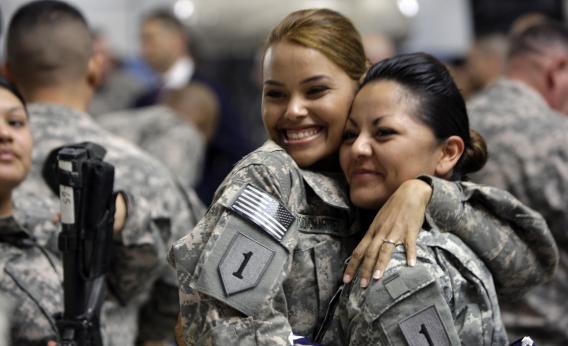For a short period of time, it seemed that we could all applaud the Pentagon’s decision to lift the military’s female combat ban. Outside of the complaints of dinosaurs like George Will and this other nut, which are more entertaining than upsetting anyway, the praise for Leon Panetta’s announcement was much louder than the dissent. Could it be that, after an Olympics where female Americans took home more gold medals than the men, the image of women as inherently delicate flowers whose bodies can barely endure the strain of a brisk walk has finally gone the way of the corset?
Not exactly. Sadly, the most infuriating argument against lifting the ban that I’ve read comes from the left. Yep, here’s Noah Berlatsky at the Atlantic with his feminist case against women in combat, in which he bemoans a feminism that is more interested in equality than promoting what he presumes to be the female-specific value of pacifism.
The problem is, feminism has never just been about equality. Many feminists have written about the need for women to have the same opportunities as men. But many have also written about the need to criticize male patriarchal values and ideals. And one of the male patriarchal values and ideals that has been consistently criticized and questioned by feminists is war …
The history of combat may not be entirely male, but it is overwhelmingly male. And that fact is not merely an inequality; it is a resource. Yes, you can look at the exclusion of women from combat and say, “This is unfair; women should be allowed to fight.” But you can also look at that exclusion and say, “You know, half of humanity has been excluded from going to war. If that many people weren’t fighting, maybe that means that fighting is an aberration rather than a necessity.”
Seems like a weak case to me. Half of humanity was also excluded from working outside of the home for much of history, but that doesn’t mean that employment should be treated as an aberration. And more importantly, this argument makes a common but fatal mistake of assuming that because a value—in this case, war—is patriarchal, it must somehow fundamentally be “male.” Sure, being sent off to fight in war is something that has been part of the typical male experience for huge chunks of history, but not necessarily because most men will it that way. Rather, it’s because their political leaders made them do it, by bullying, conscription, or in our modern era, exploiting their poverty. Yes, it’s mostly men who enact violence, but that’s because it’s mostly men who have power that they want to keep.
By conflating “male” values and patriarchal values, Berlatsky ignores the way that men have been abused by more powerful men throughout time, and also ignores that a large part of the history of war has been a history of men resisting it. Resistance to violence is not a female value.
So why, then, does male dominance lead to so much violence, from war to rape to child abuse? It’s not the “male” part of the equation so much as it’s the “dominance” part. (Violence isn’t a “white” value anymore than it’s a “male” value, but sure enough, white supremacy led to lynchings and brutally violent attacks on civil rights protesters.) Hopefully the greater inclusion of women into the military will help us all see that violence and war is learned behavior—it’s not inevitable. Women entering combat roles isn’t feminism acquiescing to male values, and women don’t have a unique duty to overturn the glorification of violence and power that leads to war. That’s a job for everyone.
